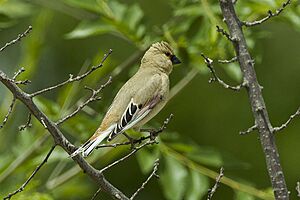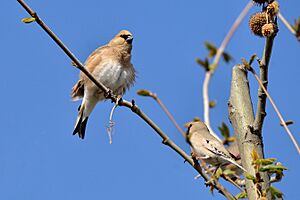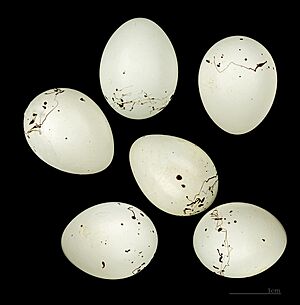Desert finch facts for kids
Quick facts for kids Desert finch |
|
|---|---|
 |
|
| Conservation status | |
| Scientific classification |
|
| Kingdom: | Animalia |
| Phylum: | Chordata |
| Class: | Aves |
| Order: | Passeriformes |
| Family: | Fringillidae |
| Subfamily: | Carduelinae |
| Genus: | Rhodospiza Sharpe, 1888 |
| Species: |
R. obsoleta
|
| Binomial name | |
| Rhodospiza obsoleta (Lichtenstein, MHC, 1823)
|
|
| Script error: The function "autoWithCaption" does not exist. | |
| Synonyms | |
|
Fringilla obsoleta |
|
Script error: No such module "Check for conflicting parameters".
The desert finch (Rhodospiza obsoleta) is a medium-sized brown bird. It belongs to the true finch family, called Fringillidae. You can find these birds in the southern parts of Eurasia. Sometimes, people call it Lichtenstein's desert finch.
Contents
What Does the Desert Finch Look Like?
The desert finch is about 26 centimetres (10 in) wide when its wings are spread. It has a strong, black beak. Its wing feathers and tail feathers are black and white.
A special feature is a bright rosy-pink patch on each wing. Female birds are a bit duller in color than males. However, both male and female adult birds look quite similar overall.
Where Do Desert Finches Live?
These birds love living in desert areas. But they need water nearby to survive. You can also find them in low mountains and hills. They sometimes live in farmed valleys too.
What Do Desert Finches Eat?
Desert finches mostly eat seeds. They also snack on insects now and then.
Nesting and Family Life
Desert finches build their nests in trees during springtime. They often choose fruit trees in orchards. The female bird lays about 4 to 6 eggs. These eggs are pale green with light speckles. The female then sits on the eggs to keep them warm until they hatch.
How Do They Travel?
Desert finches do not migrate long distances. They usually stay in their local areas. These birds often gather near human settlements in the countryside. Orchards with plenty of water in dry lands are perfect homes for them. You might see them feeding in large groups of their own kind. They also mix with other types of finches.
Desert Finch Family Tree
Scientists have studied the desert finch's DNA. This research shows that the desert finch is closely related to greenfinches. Greenfinches are birds in the genus Carduelis or Chloris. This connection is also seen in their calls and a black stripe near their eyes.
It seems the desert finch might be very similar to the ancient ancestor of greenfinches. Perhaps greenfinches evolved from a desert bird and later became green. Or, their common ancestor lived in semi-dry areas about 6 million years ago. Then, some birds adapted to true deserts (like the desert finch). Others adapted to woodlands (like the greenfinches).
 | Selma Burke |
 | Pauline Powell Burns |
 | Frederick J. Brown |
 | Robert Blackburn |




